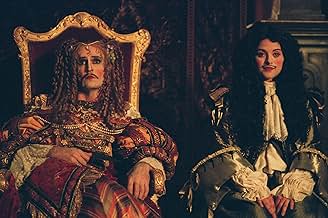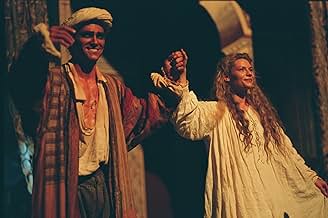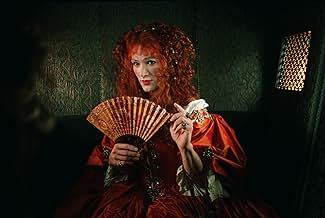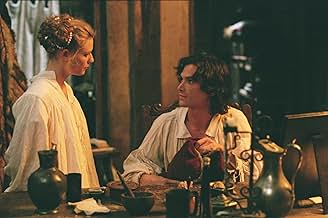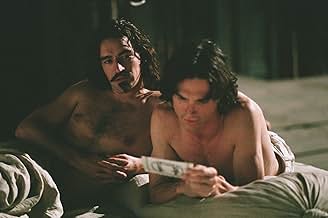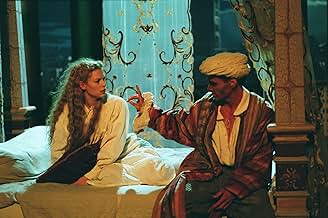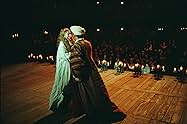Adicionar um enredo no seu idiomaA female theatre dresser creates a stir and sparks a revolution in seventeenth century London theatre by playing Desdemona in Othello. But what will become of the male actor she once worked ... Ler tudoA female theatre dresser creates a stir and sparks a revolution in seventeenth century London theatre by playing Desdemona in Othello. But what will become of the male actor she once worked for and eventually replaced?A female theatre dresser creates a stir and sparks a revolution in seventeenth century London theatre by playing Desdemona in Othello. But what will become of the male actor she once worked for and eventually replaced?
- Prêmios
- 4 vitórias e 1 indicação no total
Avaliações em destaque
It tells the tale of Ned (Billy Crudup), a young actor who specialises in portraying women on stage. In a world where only men are allowed to tread the boards, Ned's "Desdemona" (from Shakespeare's Othello) is the closest thing 17th century audiences get to femininity in theatre. However, a young upstart in the form of Maria (played by Clare Danes) wants to change all that. She has a passion for drama and unfortunately the bisexual Ned. With the help of King Charles II (Rupert Everett), she may just get her wish, changing theatre forever, and hopefully pick up Ned on the way.
When thinking of the themes of the film, many people dismiss it as a clone of Shakespeare in Love. This is unfair- the film is more thought provoking, substantial and better acted than the aforementioned Oscar snaffler. It explores themes of sexuality and gender with insight and intelligence as well as telling (and, in fact enthralling us with) a love story. As previously referred to, the acting is exceptional, especially the two leads (Danes and Crudup) who shine. The supporting cast is strong too, with Richard Griffiths as a heterosexual prequel to his role in Withnail and I, Tom Wilkinson brimming with quiet intensity as Betterton and Everett hamming it up wonderfully as the King.
Even if it does end on a slightly trite note (not to give too much away, but its' "birth of method acting" shtick irritates), Stage Beauty is a funny, heart-warming and occasionally quite cerebral meditation on love and art. What more could any theatre, or film lover for that matter, want? And don't say Shakespeare In Love!
This movie gives us a glimpse of how theatre functioned in England up to the times of Charles II. The female roles of all plays were portrayed by male actors. The school of acting in that era was an artificial one where actors relied in gestures and affectations that would be laughable today in a serious drama, but that was the way it was the accepted Method then, nothing to do with Stanivslaski, or Strassberg.
The leading figure of that theatrical world was Ned Keynaston, who was the most famous Desdemona of his time. There must have been a lot of gay men that were attracted to that world, as was the case with Mr. Keynaston, who might have been bisexual, although that comes as a secondary subplot. This actor is greatly admired by all, including the dressing assistant, Maria. This girl loved to be in the theatre, but could not, because only men were allowed. So instead, she goes to a second rate company that puts on plays in a pub and emerges as Margaret Hughes, an actress in her own right who will challenge Keynaston's Desdemona and makes that role, her signature role as well.
Claire Danes, as Maria, or Margaret Hughes, has never been better! She shines as the girl whose ambition is to be on stage. She is wonderful in the part. Ned, played with gusto by Billy Crudup, shows an unexpected range, although he has done theatre extensively. Both of these actors takes us back to London and make us believe that what we are watching.
A glorious English cast behind the two American principals are gathered to play effortlessly the theatrical figures of the time, and also the King and his court. Ruper Everett, as King Charles II, is hilarious. The scene in which he plays in drag with his mistress, Nell Gwynn, is one of the best things of the movie. Also, Richard Griffith, as lecherous Sir Charles Sedley, gives a stellar performance. Ben Chaplin, as the Duke of Buckingham, reveals the ambiguity of the men that were attracted to those early thespians.
Thoroughly enjoyable because of Richard Eyre's direction and eye for detail.
Don't expect an elegant historical romp from Stage Beauty; it's much more than that. Director Richard Eyre (Iris) and screenwriter Jeffrey Hatcher have loosely interpreted true events to deliver a passionate, romantic journey of gender-bending self-realisation set in the bawdy world of the British Restoration, circa 1660.
In a time when women are banned from acting on stage, King Charles II is on the throne, accompanied everywhere by his vulgar but merry mistress, Nell Gwnn. Meanwhile Ned Kynaston (Billy Crudup) is the most celebrated leading lady of his time. He is adored by his audiences, by his lover and patron the Duke of Buckingham, and secretly loved by his dresser Maria (Claire Danes). But when aspiring actress Maria's illegal performance as Desdemona in Othello triggers royal permission for women to act on stage, Kynaston's fall from grace is swift.
This is an actors' film, where the talents of Danes and in particular, Crudup, shine. (Their remarkable relationship triggered an off-screen romance.) Crudup is taut as the bisexual Kynaston, trained to be a calamity and actress since early adolescence, and emotes powerfully as he struggles with his sexuality and identity in an unfriendly new political landscape. He is alternately a catty drag queen, angry young man and committed thespian, without ever straying beyond credibility. In contrast, Danes is luminous but unsure as Maria. A talented supporting cast includes Rupert Everett, providing comic relief as the languid King, while Ben Chaplin is sensual as the self-serving Duke.
Stage Beauty has been compared to Shakespeare in Love, but although it's less successful, it's far less contrived. Although Stage Beauty is a love story, you don't know how things will resolve. The pace is less brisk than in a more manufactured film, but it's also more realistic, enhanced by production design and costuming which depicts both the grit and the sumptuousness of the time.
While at first the on stage acting grates, it is deliberate. As Stage Beauty progresses, the acting technique evolves to resemble 19th Century Naturalism not true to life, but faithful to the emotional journey of the characters. It's a special film that will take you on an emotional journey too.
**** out of ***** stars.
"Stage Beauty" is set in the world of seventeenth-century Restoration theatre, but the stage serves as a microcosm for life itself, and the roles played by the actors before the public mirror the roles they play in their private lives. The question is, do they create their roles, or do their roles create them?
Ned Kynaston (Billy Crudup) is an actor who takes on women's roles, since real women are not permitted to do so. He has been thoroughly trained and schooled in the then highly stylized technique of portraying women -- to such an extent that any trace of masculinity seems to have been drummed out of him.
His dresser Maria (Clare Danes) yearns to be an actress herself, but is prevented from doing so by the narrow conventions of Puritan England -- until Charles II is restored to the throne and decrees that, henceforth, real women shall play women's roles on the stage. A whole new world opens up for Maria, but it looks like curtains for Ned.
What happens next is pure anachronism: Ned and Maria are able to rise above the limitations and constraints of their era. Not only do they transcend their gender or sex roles, but they overcome their classical training and, in effect, engage in Method acting, a technique still three hundred years away in the far-distant future. When he teaches Maria how to break the mold and play Othello's Desdemona in a whole new, natural way, Ned becomes a seventeenth-century Stanislavsky.
But, by George, it works. Their performance of the celebrated death scene from "Othello" sends shock waves through an audience accustomed to pantomime and exaggerated gestures -- and it electrifies us as well.
Not since Joseph Fiennes and Gwyneth Paltrow in "Shakespeare in Love" have an actor and actress so shimmered and shone simultaneously on stage and screen. One hopes that Billy Crudup and Clare Danes will be remembered for their luminous performances at the 2005 Academy Awards.
Você sabia?
- CuriosidadesClaire Danes and Billy Crudup became a couple after the filming of this movie. Crudup left his long-time girlfriend Mary-Louise Parker for Danes.
- Erros de gravaçãoNed Kynaston, age 20-something, says that he's been playing women on stage for half his life, since he was a child. But at the royal banquet, the King says that the theatres have only recently reopened after an 18-year shutdown caused by the Puritan takeover.
- Citações
King Charles II: Why shouldn't we have women on stage? After all, the French have been doing it for years.
Sir Edward Hyde: Whenever we're about to do something truly horrible, we always say that the French have been doing it for years.
Principais escolhas
- How long is Stage Beauty?Fornecido pela Alexa
Detalhes
- Data de lançamento
- Países de origem
- Centrais de atendimento oficiais
- Idioma
- Também conhecido como
- Stage Beauty
- Locações de filme
- Empresas de produção
- Consulte mais créditos da empresa na IMDbPro
Bilheteria
- Faturamento bruto nos EUA e Canadá
- US$ 782.383
- Fim de semana de estreia nos EUA e Canadá
- US$ 38.654
- 10 de out. de 2004
- Faturamento bruto mundial
- US$ 2.307.092
- Tempo de duração
- 1 h 46 min(106 min)
- Mixagem de som
- Proporção
- 2.35 : 1



